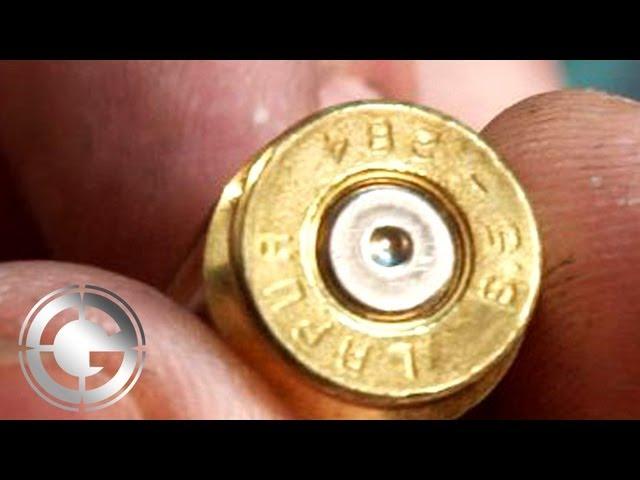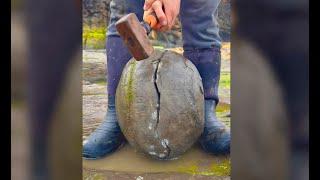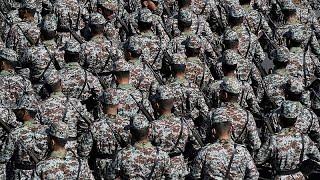Комментарии:

Pointing out the ejector mark with a pointed object and keeping it on screen longer would be helpful
Ответить
In some cases 1/2gr below sign is a little thin on safety margin. Especially if you are running double based powder and testing below the max temperature you might operate at.
Ответить
You spent about .5 seconds actuallly showing the marks.
Ответить
I use primer indicators like flatter primers or craters around the firing pin as not all rifles will show ejector indicators. As u raise pressure you’ll get flatter then craters till u blow the firing pin hole out. A slight crater is as I see it a hot decent load on the edge oh being max but it depends on FP channel size. This is the most used method
Ответить
I have a question, will you get the same mark on a piece of brass fored for a winchester model 70 push feed rifle?
Ответить
there was no mention of stiff bolt lift ,, would this show up later after sign on the primer face ? lots of variables for sure
Ответить
What do under powered,normal and overcharged cartridge shells look like.
Your a waste of time.

You fired a shot in your test chamber, showed the primer with firing pin indent, fired another shot and showed an unfired primer......?
Ответить
Use a large magnifying glass to show close up of cartridge and low light , reflection takes away detail on brass .
Ответить
Thank you for your video
Ответить
Thanks. Very clearly explained.
Ответить
All well and done verbally but it would be nice to have a visual of the case head showing the pressure signs.
Ответить
I will sometimes be at less than max load with powder charges but my velocity will be close to or over published velocity for max load. Even without pressure signs, I stop short of max. What am I saying? Use more than just pressure signs
Ответить
Very precise, informative and to the point…….well done
Ответить
I would have crapped myself having my hand there while firing overloaded rounds.
Ответить
Wrong way
Ответить
If you new how to use a micrometer you would be way ahead on finding pressure signs. This method your using you get way to much pressure fast. The real gunsmith randy selby has great vdo on how to reload and pressure signs.
Ответить
This is a very fast way of finding a load. What he won't tell you is that a lot of guys find their node ABOVE listed book max. Let the rifle tell you what it likes. If you do this method while shooting groups and recording your velocity, Its very possible to hit at 1000 in under 12 rounds total. Or, in under 12 rounds you might switch powder, to find something your rifle likes. What's your jump? Who cares, load to magazine length! Wish I would have learned this years ago, would have saved 100's of pcs of brass, 1000's of dollars, and weeks of time.
Ответить
Very helpful
Ответить
What gets me is the "science" of high pressure "readings" and the half grain reduction. They can send men to Moon, U.S.A. (since we own it) but they can't come up with an accurate way of measuring cartridge pressure.
Ответить
I never thought of that, thanks I appreciate your video on this. I will try this
Ответить
It’s funny
Your trying to look for marked
You could not see
You said your going to show the obvious
Thanks
Lol

If you live long enough you see everything. This video is not wrong..... and that surprises me.
Ответить
Excellent information in a clearly understood demonstration. Very helpful information.
Ответить
Fuck You.
Ответить
Nope you are completely wrong with your explanation. Maximum powder charge is useing a 2x4 to wack the bolt open. Perfect load. That why we shoot rugar no 1s screw pressure signs go big.
Ответить
Can’t see that mark on the brass. Just do a study extreme close-up with an arrow pointing to the issue.
Ответить
What about micing case heads for. Max expantion of .0005 max expand
Ответить
This guy is a jerk off who dosent have a clue about what hes talking about
Ответить
I really appreciate all your informative videos.. Do y'all have a publication with your favorite recipes for different calibers? I know there are many variables depending on location altitude humidity barometric pressure etc, but I think it would save a lot of time and money experimenting with so many different recipes..
Ответить
This video looks more like a "cookie cutter" or "canned" type of video with no real good explanations, and visuals were on the poor side. He runs through it too quickly.
Ответить
You're brave standing next to the rifle and holding it and firing it at the same time. I would have stood behind the rifle incase the action and/or the barrel ruptured from excessive pressure.
Ответить
Thanks Darren. Great video
Ответить
At what seating depth do you do this test? .010 jam , .010 jump or more?
Ответить
There is an analytical approach to the safe maximum load. One must also keep in mind that many powders are temperature sensitive. That is to say that pressure and velocity go up when the operating temperature ( usually close to ambient) rises. This also means that if you let a round heat soak in a hot chamber a marginal max load may go over max.
The analytical method relies on the fact that pressure and velocity correlate. Higher pressure upon firing with a given powder will generally yield higher velocity. Since most of us in the field cannot measure pressure we can, however, measure velocity with our chronograph. So, taking handbook data first calculate the velocity per grain of the bulk load at each of the loads in the manual(s). I like to use at least three published manuals to account for random variability. These velocity (FPS)/ total grains will usually sit within a few FPS of each other for the same manual as the loads and velocities increase. . Now as you move up close to and beyond the published maximum compute the incremental increase in velocity that the additional powder gives you. Fire at least 3 but 6 or more is better and compute the mean. Whenever your incremental fps/grain is more than the bulk fps/grain you are entering the danger zone. Now you need to watch the primer pockets and case head for signs. A South African Ballistician ( don't remember his name) developed this approach. Whenever you get approaching 1.5 times the bulk average velocity increase for the incremental powder charge you probably should stop EVEN if you do not see physical signs of deformation at the case head. One more condition; keep the increases at or below 0.5 grains in cases over 50 grains and at or near 10% for smaller cases. So a 222 Rem Mag should not be incremented more that about 0.2 grains as you move up.
For my Ruger M77 in 7 Rem Mag with a 24 inch barrel I got to 3280 fps with the 150 grain Nosler BTBT. This is more than the max in the manual. The load was 68 grains of IMR 4350 with a CCI 250 using Nosler Brass. RP brass will not go this hot without heavy bolt lift. There was no heavy bolt lift and no primer pocket or other deformation and I was only at about 1.3 times the bulk for my last 0.5 grain increase. But I stopped. Another 20-30 fps was not worth pushing it. I now have a hot but safe load that is way faster than the Hornady Superformance load.

The obvious mark is not so obvious...in the video.
Ответить
I would never use this method.
Ответить
There is a really good follow up video to this by jujitsu 2000. That goes over indications of overpressure by looking at your primers and the backs of your cases.
Ответить
Use a Mic on the pressure ring...THAT is the only sure way to measure over pressure...
Ответить
I didn't see anything he was pointing at. Should have zoomed in a little with the camera.
Ответить
How did this BS get 467 thumbs ups?!?
Ответить
I have observed that I get the round ejector "wipes" on brass when firing safe, but hot, loads in a brand new rifle. The same loads in the same rifle do not exhibit that indication after a few dozen rounds. This experience is in rotating bolt AR type rifles, and also in a 5.56 Tavor. I have assumed that this is due to the bolt and receiver extension "wearing in". After 30-40 rounds the "wipes" do not appear.
Ответить
Honestly the smiley face make needs to be addressed more. What does it look like ,with a close up.
Ответить
Never use one source of powder charge, use two or more for safety, as there are mistakes which can blow up the breach. Note letting the ammo sit in the sun can greatly increase the pressure to the point of serious problems. I saw an M1A explode 3 feet from me and the gun bolt exploded, and really hurt his left arm. Do not assume anything, everything matters keep records, temperature, wind, compass treading, and do not load maximum unless you know that this is the best for your specific gun, I use a separate book for each gun, for total shots through the barrel, barrel wear, accuracy, and date each batch of reloads on the box with bullet lot and powder lot and brass manufacturer, as all these matter in pressure, at max loads. Remington brass verses Winchester has 1/2 to 1 MOA difference at 600'yards. Weigh all brass lots and keep the difference in weights of each piece within a known range. Do not mix manufacturer lots, military brass, or odd weight brass pieces as serious issues
Ответить


























